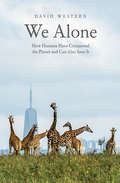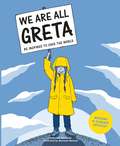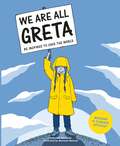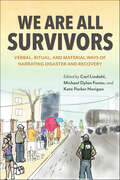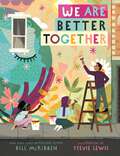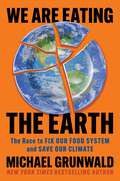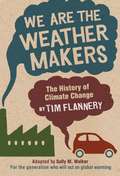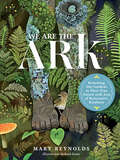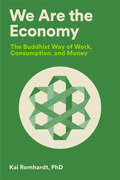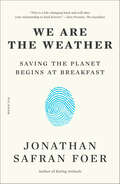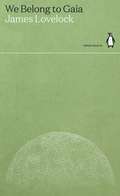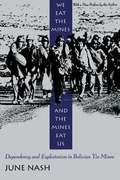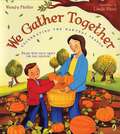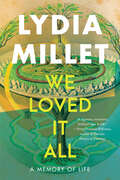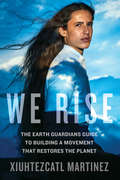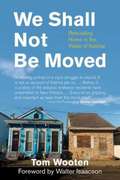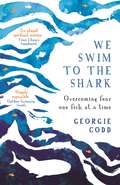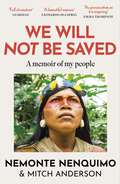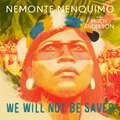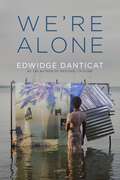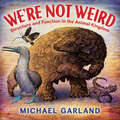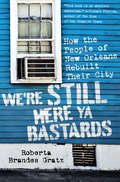- Table View
- List View
We Alone: How Humans Have Conquered the Planet and Can Also Save It
by David WesternA thoughtful exploration of how humans have endangered the Earth but can pull it back from the brink, as told by a renowned conservationist This personal and thoughtful book by renowned Kenya conservationist David Western traces our global conquest from Maasai herders battling droughts in Africa to the technological frontiers of California. Western draws on a half century of research in the savannas and his own life’s journey to argue that conservation is not a modern invention. The success of all societies past and present lies in conservation practices, breaking biological barriers and learning to live in large cooperative groups able to sustain a healthy environment. Our ecological emancipation from nature enabled us to expand our horizons from conserving food and water for survival to saving whales, elephants, and our cultural heritage. In the Anthropocene, our scientific knowledge and modern sensibilities offer hope for combating global warming and creating a planet able to sustain the wealth of life, but only if we use our unique cultural capacity of cooperation to plan our future.
We Are All Greta: Be Inspired By Greta Thunberg To Save The World
by Valentina Giannella"Humans are very adaptable: We can still fix this. But the opportunity to do so will not last for long. We must start today. We have no more excuses" GRETA THUNBERGFollow in the footsteps of the Swedish teenage activist and Nobel Peace Prize candidate in We Are All Greta and join the global mission to save our planet from climate change. Greta Thunberg, author of No One is too Small to Make a Difference, has directed the attention of adults and her peers alike to issues crucial to the future of the planet, and the heads of even the youngest children have been filled with questions. GLOBAL WARMING, THE GREENHOUSE EFFECT, FOSSIL FUELS - what do they all mean? What are biodiversity and sustainable development? Who is studying the changes that are taking place here on Earth? Which sources are reliable? What action can I take?We Are All Greta sets out the basic ideas required to understand climate change, explained in a scientific and accessible way and drawn from the most authoritative sources. With a chapter on key words and sites to help you understand the climate challenge and a list of websites to visit for further information, this is a book for young people, for parents, for grandparents and anyone having to answer direct and urgent questions about what must be done to protect our world.WHAT EARLY READERS ARE SAYING ABOUT WE ARE ALL GRETA"Very good for young & older readers. This applies to every one of us on this planet!""Since we have only about 12 years before climate change is irreversible, this is a very timely book. Highly recommended.""It is suitable for children and adults alike and I would recommend it to anyone wanting to learn more about global warming.""Definitely a good place to start when teaching kids about the environment."
We Are All Greta: Be Inspired to Save the World
by Valentina GiannellaHumans are very adaptable: We can still fix this. But the opportunity to do so will not last for long. We must start today. We have no more excuses'GRETA THUNBERGFollow in the footsteps of the Swedish teenage activist and Nobel Peace Prize candidate in We Are All Greta and join the global mission to save our planet from climate change.Greta Thunberg, author of No One is too Small to Make a Difference, has directed the attention of adults and her peers alike to issues crucial to the future of the planet, and the heads of even the youngest children have been filled with questions. GLOBAL WARMING, THE GREENHOUSE EFFECT, FOSSIL FUELS - what do they all mean? What are biodiversity and sustainable development? Who is studying the changes that are taking place here on Earth? Which sources are reliable? What action can I take?We Are All Greta sets out the basic ideas required to understand climate change, explained in a scientific and accessible way and drawn from the most authoritative sources. With a chapter on key words and sites to help you understand the climate challenge and a list of websites to visit for further information, this is a book for young people, for parents, for grandparents and anyone having to answer direct and urgent questions about what must be done to protect our world.WHAT EARLY READERS ARE SAYING ABOUT WE ARE ALL GRETA'Will enable readers to understand the climate emergency and learn what can be done to help. Highly illustrated, and with clear, in-depth text and data, it will answer young readers' questions on what climate change means, what its consequences will be, and what must be done to protect our world'LOVEREADING4KIDS BOOK OF THE MONTH'A must-read book for all the citizens of Earth! You want to save Earth and all in it, stop complaining and start saving''A really informative and helpful book that is suitable for both adults and older kids. It was the perfect length and took the time it needed to get the message across without bogging us down''Managed to explore a lot of issues in an accessible way, with a great glossary at the end, and also managed to make points without being too scary, preachy or didactic - no mean feat in this field'
We Are All Greta: Be Inspired to Save the World
by Valentina GiannellaHumans are very adaptable: We can still fix this. But the opportunity to do so will not last for long. We must start today. We have no more excuses'GRETA THUNBERGFollow in the footsteps of the Swedish teenage activist and Nobel Peace Prize candidate in We Are All Greta and join the global mission to save our planet from climate change.Greta Thunberg, author of No One is too Small to Make a Difference, has directed the attention of adults and her peers alike to issues crucial to the future of the planet, and the heads of even the youngest children have been filled with questions. GLOBAL WARMING, THE GREENHOUSE EFFECT, FOSSIL FUELS - what do they all mean? What are biodiversity and sustainable development? Who is studying the changes that are taking place here on Earth? Which sources are reliable? What action can I take?We Are All Greta sets out the basic ideas required to understand climate change, explained in a scientific and accessible way and drawn from the most authoritative sources. With a chapter on key words and sites to help you understand the climate challenge and a list of websites to visit for further information, this is a book for young people, for parents, for grandparents and anyone having to answer direct and urgent questions about what must be done to protect our world.WHAT EARLY READERS ARE SAYING ABOUT WE ARE ALL GRETA'Will enable readers to understand the climate emergency and learn what can be done to help. Highly illustrated, and with clear, in-depth text and data, it will answer young readers' questions on what climate change means, what its consequences will be, and what must be done to protect our world'LOVEREADING4KIDS BOOK OF THE MONTH'A must-read book for all the citizens of Earth! You want to save Earth and all in it, stop complaining and start saving''A really informative and helpful book that is suitable for both adults and older kids. It was the perfect length and took the time it needed to get the message across without bogging us down''Managed to explore a lot of issues in an accessible way, with a great glossary at the end, and also managed to make points without being too scary, preachy or didactic - no mean feat in this field
We Are All Greta: Be Inspired to Save the World
by Valentina GiannellaHumans are very adaptable: We can still fix this. But the opportunity to do so will not last for long. We must start today. We have no more excuses'GRETA THUNBERGFollow in the footsteps of the Swedish teenage activist and Nobel Peace Prize candidate in We Are All Greta and join the global mission to save our planet from climate change.Greta Thunberg, author of No One is too Small to Make a Difference, has directed the attention of adults and her peers alike to issues crucial to the future of the planet, and the heads of even the youngest children have been filled with questions. GLOBAL WARMING, THE GREENHOUSE EFFECT, FOSSIL FUELS - what do they all mean? What are biodiversity and sustainable development? Who is studying the changes that are taking place here on Earth? Which sources are reliable? What action can I take?We Are All Greta sets out the basic ideas required to understand climate change, explained in a scientific and accessible way and drawn from the most authoritative sources. With a chapter on key words and sites to help you understand the climate challenge and a list of websites to visit for further information, this is a book for young people, for parents, for grandparents and anyone having to answer direct and urgent questions about what must be done to protect our world.WHAT EARLY READERS ARE SAYING ABOUT WE ARE ALL GRETA'Will enable readers to understand the climate emergency and learn what can be done to help. Highly illustrated, and with clear, in-depth text and data, it will answer young readers' questions on what climate change means, what its consequences will be, and what must be done to protect our world'LOVEREADING4KIDS BOOK OF THE MONTH'A must-read book for all the citizens of Earth! You want to save Earth and all in it, stop complaining and start saving''A really informative and helpful book that is suitable for both adults and older kids. It was the perfect length and took the time it needed to get the message across without bogging us down''Managed to explore a lot of issues in an accessible way, with a great glossary at the end, and also managed to make points without being too scary, preachy or didactic - no mean feat in this field'
We Are All Survivors: Verbal, Ritual, and Material Ways of Narrating Disaster and Recovery
by Carl Lindahl, Michael Dylan Foster and Kate Parker HoriganWhat is the role of folklore in the discussion of catastrophe and trauma? How do disaster survivors use language, ritual, and the material world to articulate their experiences? What insights and tools can the field of folkloristics offer survivors for navigating and narrating disaster and its aftermath? Can folklorists contribute to broader understandings of empathy and the roles of listening in ethnographic work?We Are All Survivors is a collection of essays exploring the role of folklore in the wake of disaster. Contributors include scholars from the United States and Japan who have long worked with disaster-stricken communities or are disaster survivors themselves; individual chapters address Hurricane Katrina, Hurricane Maria, and two earthquakes in Japan, including the earthquake, tsunami, and nuclear disaster of 2011. Adapted from a 2017 special issue of Fabula (from the International Society for Folk Narrative Research), the book includes a revised introduction, an additional chapter with original illustrations, and a new conclusion considering how folklorists are documenting the COVID-19 pandemic.We Are All Survivors bears witness to survivors' expressions of remembrance, grieving, and healing.
We Are Better Together
by Bill McKibbenFrom environmentalist and bestselling author Bill McKibben comes a hopeful, inspiring picture book celebrating the power of human cooperation and the beauty of life on Earth, beautifully illustrated by artist Stevie Lewis. When we work together, we humans can do incredible things. We share the responsibility to address climate change and our changing planet. It is critical that we act collectively to protect our beautiful, fragile world. Renowned environmentalist Bill McKibben and the incredibly talented artist Stevie Lewis team up to bring this gorgeous picture book to life. Celebrating the amazing things people can do, it’s an inspiring message of hope.
We Are Eating the Earth: The Race to Fix Our Food System and Save Our Climate
by Michael GrunwaldFrom the author of New York Times bestseller The New New Deal, a groundbreaking piece of reportage from the trenches of the next climate war: the fight to fix our food system.Humanity has cleared a land mass the size of Asia plus Europe to grow food, and our food system generates a third of our carbon emissions. By 2050, we&’re going to need a lot more calories to fill nearly 10 billion bellies, but we can&’t feed the world without frying it if we keep tearing down an acre of rainforest every six seconds. We are eating the earth, and the greatest challenge facing our species will be to slow our relentless expansion of farmland into nature. Even if we quit fossil fuels, we&’ll keep hurtling towards climate chaos if we don&’t solve our food and land problems. In this rollicking, shocking narrative, Grunwald shows how the world, after decades of ignoring the climate problem at the center of our plates, has pivoted to making it worse, embracing solutions that sound sustainable but could make it even harder to grow more food with less land. But he also tells the stories of the dynamic scientists and entrepreneurs pursuing real solutions, from a jungle-tough miracle crop called pongamia to genetically-edited cattle embryos, from Impossible Whoppers to a non-polluting pesticide that uses the technology behind the COVID vaccines to constipate beetles to death. It&’s an often infuriating saga of lobbyists, politicians, and even the scientific establishment making terrible choices for humanity, but it&’s also a hopeful account of the people figuring out what needs to be done—and trying to do it. Michael Grunwald, bestselling author of The Swamp and The New New Deal, builds his narrative around a brilliant, relentless, unforgettable food and land expert named Tim Searchinger. He chronicles Searchinger&’s uphill battles against bad science and bad politics, both driven by the overwhelming influence of agricultural interests. And he illuminates a path that could save our planetary home for ourselves and future generations—through better policy, technology, and behavior, as well as a new land ethic recognizing that every acre matters.
We Are The Weather Makers: The History Of Climate Change
by Tim Flannery Sally M. WalkerFirst published for an adult readership, The Weather Makers got kudos for its solid science and powerful message. This accessible edition speaks directly to young adults, offering a clear look at the history of climate change, how matters will unfold over the next century, and what we can do to prevent a cataclysmic future. Featured are twenty-five practical tips for living a greener lifestyle—at home, in school, in the community, and ultimately, on Earth.
We Are the ARK: Returning Our Gardens to Their True Nature Through Acts of Restorative Kindness
by Mary Reynolds&“Reynolds gives us a much-needed reason for hope. The gardener, the conservationist, the city planner, and the nature lover will all be inspired for this wonderful book shows how thousands of even small wildlife friendly gardens can provide habitat for embattled wildlife around the world.&” —Jane Goodall, Phd, DBE, Founder of the Jane Goodall Institute & UN Messenger of Peace Individuals can&’t save the world alone. But if millions of us work together to save our own patch of earth—then we really have a shot. How do we do it? With Acts of Restorative Kindness (ARK). An ARK is a restored, native ecosystem. It&’s a thriving patch of native plants and creatures that have been allowed and supported to re-establish in the earth's intelligent, successional process of natural restoration. Over time, this becomes a pantry and a habitat for our pollinators and wild creatures who are in desperate need of support. These ARKs will become the seeding grounds for our planet&’s new story. They will be sanctuaries for our shared kin—the rooted and unrooted—and safe havens for the magic and abundance of the natural world. Most importantly, the ARK-building actions are within our control and laid out here in We Are the ARK. In these inspiring pages, discover how one person&’s actions can effect big change in this world. Even the tiniest postage stamp patch of land matters! Together we are building a patchwork quilt of life that will wrap its way around this planet.
We Are the Economy: The Buddhist Way of Work, Consumption, and Money
by Kai RomhardtA no-nonsense Zen approach to our economic realities can change everything and help us regain our freedom. Is it possible to be personally fulfilled, and also make a difference within our current financial system? If you're skeptical, business coach and Zen practitioner Kai Romhardt proposes a minimalist, awareness-based strategy that totally reconfigures our core economic relationships: work, consumption, and money.How do we do that? We need to pause, breathe, and get in touch with our true intentions. Too often, we think of the economy as something outside of us, as beyond the scope of our individual choices. We're unhappy with how things are going, with unthinking growth that polarizes our world and condenses wealth at the top, but we don't know what to do. Romhardt argues that individuals who wield a sharp Buddhist mindset can, in fact, create change through personal decisions: when we can see in to society, and in to our constructs, we become empowered to choose deeply real and purposeful lives.
We Are the Weather: Saving the Planet Begins at Breakfast
by Jonathan Safran FoerIn We Are the Weather, Jonathan Safran Foer explores the central global dilemma of our time in a surprising, deeply personal, and urgent new way. Some people reject the fact, overwhelmingly supported by scientists, that our planet is warming because of human activity. But do those of us who accept the reality of human-caused climate change truly believe it? If we did, surely we would be roused to act on what we know. Will future generations distinguish between those who didn’t believe in the science of global warming and those who said they accepted the science but failed to change their lives in response?The task of saving the planet will involve a great reckoning with ourselves—with our all-too-human reluctance to sacrifice immediate comfort for the sake of the future. We have, he reveals, turned our planet into a farm for growing animal products, and the consequences are catastrophic. Only collective action will save our home and way of life. And it all starts with what we eat—and don’t eat—for breakfast.
We Belong to Gaia (Green Ideas)
by James LovelockIn twenty short books, Penguin brings you the classics of the environmental movement.James Lovelock's We Belong to Gaia draws on decades of wisdom to lay out the history of our remarkable planet, to show that it is not ours to be exploited - and warns us that it is fighting back.Over the past 75 years, a new canon has emerged. As life on Earth has become irrevocably altered by humans, visionary thinkers around the world have raised their voices to defend the planet, and affirm our place at the heart of its restoration. Their words have endured through the decades, becoming the classics of a movement. Together, these books show the richness of environmental thought, and point the way to a fairer, saner, greener world.
We Eat the Mines and the Mines Eat us: Dependency and Exploitation in Bolivian Tin Mines
by June NashIn this powerful anthropological study of a Bolivian tin mining town, Nash explores the influence of modern industrialization on the traditional culture of Quechua-and-Aymara-speaking Indians.
We Gather Together
by Wendy PfefferThe fall equinox signals the time of year when we gather our harvests and give thanks for their bounty. With accessible, lyrical prose and vibrant illustrations, this nonfiction picture book explains the science behind autumn and the social history of harvest-time celebrations. We Gather Together presents a remarkable range of cultural traditions throughout the ages and the world, many of which have influenced our contemporary Thanksgiving holiday. Simple science activities, ideas for celebrating in school and at home, and a further reading list are included in the back of the book.
We Loved It All: A Memory of Life
by Lydia MilletA Time Must-Read Book of 2024 • A Booklist Editors' Choice • A Washington Post Notable Nonfiction Book of 2024 "A rigorous, evocative, brilliant bow to life." —Terry Tempest Williams, author of Erosion: Essays of Undoing This lucent anti-memoir from celebrated novelist Lydia Millet explores the pain and joy of being a parent, child, and human at a moment when the richness of the planet’s life is deeply threatened. Across more than a dozen acclaimed works of fiction, readers have become intimate with Lydia Millet’s distinctive voice and sly wit. We Loved It All, her first nonfiction book, combines the precision of fact with the power of narrative to evoke our enmeshment with the more-than-human world. Emerging from Millet’s quarter century of wildlife and climate advocacy, We Loved it All marries scenes from her life with moments of nearness to “the others”— the animals and plants with whom we share the earth. Accounts of fears and failures, jobs and friendships, childhood and motherhood are interspersed with exquisite accounts of nonhumans and arresting meditations on the power of story to shape the future. Seeking to understand why we immerse ourselves in the domestic and immediate, turning away from more sweeping views, she examines how grand cultural myths can deny our longing for the company of nature and deprive us of its charisma and inspiration. In a thrilling distillation of experience and emotion, she evinces the familiar sense of feeling both well-meaning and powerless—a creature subject to forces that are baffling in their immensity. The fear and grief of extinction and climate change, Millet suggests, are forms of love that might be turned to resistance. We Loved It All shimmers with curiosity and laconic humor yet addresses with reverence the most urgent crises of our day. An incantatory, bewitching devotional to the vast and precious bestiary of the earth, it asks that we extend to other living beings the protection they deserve—the simple grace of continued existence.
We Rise: The Earth Guardians Guide to Building a Movement that Restores the Planet
by Xiuhtezcatl MartinezChallenge the status quo, change the face of activism, and confront climate change head on with the ultimate blueprint for taking action.Xiuhtezcatl Martinez is a 16-year-old climate activist, hip-hop artist, and powerful new voice on the frontlines of a global youth-led movement. He and his group the Earth Guardians believe that today’s youth will play an important role in shaping our future. They know that the choices made right now will have a lasting impact on the world of tomorrow, and people—young and old—are asking themselves what they can do to ensure a positive, just, and sustainable future. We Rise tells these stories and addresses the solutions.Beginning with the empowering story of the Earth Guardians and how Xiuhtezcatl has become a voice for his generation, We Rise explores many aspects of effective activism and provides step-by-step information on how to start and join solution-oriented movements. With conversations between Xiuhtezcatl and well-known activists, revolutionaries, and celebrities, practical advice for living a more sustainable lifestyle, and ideas and tools for building resilient communities, We Rise is an action guide on how to face the biggest problems of today, including climate change, fossil fuel extraction, and industrial agriculture.If you are interested in creating real and tangible change, We Rise will give you the inspiration and information you need to do your part in making the world a better place and leave you asking, What kind of legacy do I want to leave?
We Shall Not Be Moved
by Tom Wooten“It was heartbreaking, but we couldn’t give up. I just said, ‘Well, I’ve got to get in and do it. ’”—Phil Harris, eight-decade-long resident of Hollygrove As floodwaters drained in the weeks following Hurricane Katrina, New Orleans residents came to a difficult realization. Their city was about to undertake the largest disaster recovery in American history, yet they faced a profound leadership vacuum: members of every tier of government, from the municipal to the federal level, had fallen down on the job. We Shall Not Be Movedtells the absorbing story of the community leaders who stepped into this void to rebuild the city they loved. From a Vietnamese Catholic priest who immediately knows when two of his six thousand parishioners go missing to a single mother from the Lower Ninth Ward who instructs the likes of Jimmy Carter and Brad Pitt, these intrepid local organizers show that a city’s fate rests on the backs of its citizens. On their watch, New Orleans neighborhoods become small governments. These leaders organize their neighbors to ward off demolition threats, write comprehensive recovery plans, found community schools, open volunteer centers, raise funds to rebuild fire stations and libraries, and convince tens of thousands of skeptical residents to return home. Focusing on recovery efforts in five New Orleans neighborhoods—Broadmoor, Hollygrove, Lakeview, the Lower Ninth Ward, and Village de l’Est—Tom Wooten presents vivid narratives through the eyes and voices of residents rebuilding their homes, telling a story of resilience as entertaining as it is instructive. The unprecedented community mobilization underway in New Orleans is a silver lining of Hurricane Katrina’s legacy. By shedding light on this rebirth,We Shall Not Be Movedshows how residents, remarkably, turned a profound national failure into a story of hope. From the Hardcover edition.
We Swim to the Shark: Overcoming fear one fish at a time
by Georgie CoddGeorgie Codd is scared of fish. Really, really scared.Loving the sea and resenting her phobia, she plots to cross continents, learn to dive and swim with the world's biggest fish: the mighty whale shark.Georgie soon plunges into a realm of strange creatures and intrepid diving adventurers. But as her quest to fight fear expands over oceans, the shark remains elusive, and everything else starts to fall apart around her.'We Swim to the Shark is a lesson in not giving up . . . as with all good adventure stories, the real benefit is in the searching' THE I'An almost spiritual mission' TIMES LITERARY SUPPLEMENT 'A terrific read' BBC RADIO NORFOLK 'An enthralling ride' ABC MELBOURNE
We Swim to the Shark: Overcoming fear one fish at a time
by Georgie CoddGeorgie Codd is scared of fish. Really, really scared.Loving the sea and resenting her phobia, she plots to cross continents, learn to dive and swim with the world's biggest fish: the mighty whale shark.Georgie soon plunges into a realm of strange creatures and intrepid diving adventurers. But as her quest to fight fear expands over oceans, the shark remains elusive, and everything else starts to fall apart around her.'We Swim to the Shark is a lesson in not giving up . . . as with all good adventure stories, the real benefit is in the searching' THE I'An almost spiritual mission' TIMES LITERARY SUPPLEMENT 'A terrific read' BBC RADIO NORFOLK 'An enthralling ride' ABC MELBOURNE
We Will Not Be Saved: A memoir of hope and resistance in the Amazon rainforest
by Nemonte Nenquimo'Nemonte's writing is as provocative as it is inspiring' EMMA THOMPSON'One of the most effective leaders for indigenous rights and environmental justice' LAURENE POWELL JOBS'I'm here to tell you my story, which is also the story of my people and the story of this forest.'Born into the Waorani tribe of Ecuador's Amazon rainforest, Nemonte Nenquimo was taught about plant medicines, foraging, oral storytelling, and shamanism by her elders. Age 14, she left the forest for the first time to study with an evangelical missionary group in the city. Eventually, her ancestors began appearing in her dreams, pleading with her to return and embrace her own culture.She listened. Two decades later, Nemonte has emerged as one of the most forceful voices in climate-change activism. She has spearheaded the alliance of indigenous nations across the Upper Amazon and led her people to a landmark victory against Big Oil, protecting over a half million acres of primary rainforest. Her message is as sharp as the spears that her ancestors wielded - honed by her experiences battling loggers, miners, oil companies and missionaries.In this astonishing memoir, she partners with her husband Mitch Anderson, founder of Amazon Frontlines, digging into generations of oral history, uprooting centuries of conquest, hacking away at racist notions of Indigenous peoples, and ultimately revealing a life story as rich, harsh and vital as the Amazon rainforest herself.More praise for We Will Not Be Saved: 'A radical manifesto for our times' VANESSA KIRBY'An act of storytelling generosity' NATHALIE KELLY'Inspiring, moving and unforgettable' ROWAN HOOPER'Truly Inspiring and humbling' CAROLINE SANDERSON** Publishing in the US as WE WILL BE JAGUARS**
We Will Not Be Saved: A memoir of hope and resistance in the Amazon rainforest
by Nemonte Nenquimo** Publishing in the US as WE WILL BE JAGUARS**'I'm here to tell you my story, which is also the story of my people and the story of this forest.'Born into the Waorani tribe of Ecuador's Amazon rainforest, Nemonte Nenquimo was taught about plant medicines, foraging, oral storytelling, and shamanism by her elders. Age 14, she left the forest for the first time to study with an evangelical missionary group in the city. Eventually, her ancestors began appearing in her dreams, pleading with her to return and embrace her own culture.She listened. Two decades later, Nemonte has emerged as one of the most forceful voices in climate-change activism. She has spearheaded the alliance of indigenous nations across the Upper Amazon and led her people to a landmark victory against Big Oil, protecting over a half million acres of primary rainforest. Her message is as sharp as the spears that her ancestors wielded - honed by her experiences battling loggers, miners, oil companies and missionaries.In this astonishing memoir, she partners with her husband Mitch Anderson, founder of Amazon Frontlines, digging into generations of oral history, uprooting centuries of conquest, hacking away at racist notions of Indigenous peoples, and ultimately revealing a life story as rich, harsh and vital as the Amazon rainforest herself.The Waorani language (referred to as Wao Tededo in the audiobook) is one of the world's most endangered languages and is only spoken by around 2,000 people. The Publishers would like to thank Oswando Nenquimo (Opi) and Connie Dickinson as well as the Endangered Languages Archive https://www.elararchive.org/ and the Endangered Languages Documentation Program https://www.eldp.net/ for their valuable support in ensuring accurate pronunciation of Waorani names and terms.
We're Alone: Essays
by Edwidge DanticatA collection of exceptional new essays by one of the most significant contemporary writers on the world stage Tracing a loose arc from Edwidge Danticat’s childhood to the COVID-19 pandemic and recent events in Haiti, the essays gathered in We’re Alone include personal narrative, reportage, and tributes to mentors and heroes such as Toni Morrison, Paule Marshall, Gabriel García Márquez, and James Baldwin that explore several abiding themes: environmental catastrophe, the traumas of colonialism, motherhood, and the complexities of resilience.From hurricanes to political violence, from her days as a new student at a Brooklyn elementary school knowing little English to her account of a shooting hoax at a Miami mall, Danticat has an extraordinary ability to move from the personal to the global and back again. Throughout, literature and art prove to be her reliable companions and guides in both tragedies and triumphs.Danticat is an irresistible presence on the page: full of heart, outrage, humor, clear thinking, and moral questioning, while reminding us of the possibilities of community. And so “we’re alone” is both a fearsome admission and an intimate invitation—we’re alone now, we can talk. We’re Alone is a book that asks us to think through some of the world’s intractable problems while deepening our understanding of one of the most significant novelists at work today.
We're Not Weird: Structure and Function in the Animal Kingdom
by Michael GarlandMeet nature&’s most extraordinary looking creatures. But they aren&’t weird!Birds with blue feet, fish that walk, unicorns in the sea, and more! Learn how these animals' quirks help them survive. Perfect for budding naturalists who are always ready to share a cool (or gross) animal fact. Very hard scales protect me, and my long tongue is perfect for eating ants. When I feel threatened, I roll myself into a ball. I am a Pangolin.See these animals&’ amazing body parts in vibrant and detailed woodcut illustrations, from the thorny dragon&’s spiky skin to the star-nosed mole's twenty-two feelers. Read how these creatures' unique traits help them thrive and survive in their environments. Learn where they live, what they eat, how they protect themselves, and more. With easy-to-read text vetted by an expert, this book aligns with the Next Generation Science Standards on adaptation, structure, and function for kindergarten through 3rd grade. With supplementary information on each animal&’s habitat and diet.
We're Still Here Ya Bastards: How the People of New Orleans Rebuilt Their City
by Roberta Brandes GratzThe aftermath of Hurricane Katrina is one of the darkest chapters is American history. A toxic combination of government neglect and socioeconomic inequality turned a crisis into a tragedy. The storm completely transformed one of the most beloved cities in America, leaving nearly 80 percent of New Orleans flooded and damaging 134,000 housing units, causing unprecedented destruction. The response to Katrina is a topic of unending debate and anger. But out of the rubble, there is hope. Watching coverage of the hurricane on television in 2005, noted urbanist and veteran journalist Roberta Brandes Gratz knew that the best chance for the city's recovery came from the people who would return to New Orleans. She also knew that she wanted to see for herself how the city would respond. Two years later, after having made several trips to the area and written several articles, Gratz bought a house in the Bywater neighborhood of New Orleans and immersed herself in the life of the city. We’re Still Here Ya Bastards presents an unprecedented panoramic look at New Orleans’ recovery in the years following the hurricane. From the Lower Ninth Ward to the storied French Quarter, Gratz shares the stories of people who returned to their homes and have taken the rebuilding of their city into their own hands. An internationally renowned urban critic, Gratz shows how the city is recovering despite erroneous governmental policies that serve private interests rather than the public good. By telling stories that are often ignored by the mainstream media, We’re Still Here Ya Bastards shows the strength and resilience of a community that continues to work to rebuild New Orleans.
